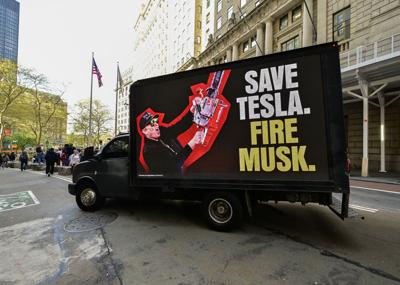ItŌĆÖs not yet time to write off Tesla and blame its demise on Elon Musk.
But for the first time in TeslaŌĆÖs 21-year history, itŌĆÖs possible to imagine that outcome. Time to start thinking of Tesla as a mere brand owned by another automaker or even a hedge fund, no longer an independent company associated with CEO and co-founder Musk.
In the possession of a well-run new owner, Tesla would still have its impressive network of factories in the U.S., Germany and China, each of them among the industryŌĆÖs most modern and efficient.
As you know, TeslaŌĆÖs sales, profits, market share and stock market valuation are in free fall. TeslaŌĆÖs U.S. unit volume was down about 13 per cent in the first quarter, a period when EV volume overall was up by about 11 per cent.
It turns out that even Tesla, still the bestselling EV brand in North America, cannot withstand absentee leadership indefinitely.
Tesla as a subsidiary of Toyota, Volkswagen or GM would still possess an enviable brand-name familiarity, or ŌĆ£brand equity,ŌĆØ once Musk and his increasingly toxic personality was detached from the company.
And a Tesla without Musk would retain its remarkable design and engineering expertise. Tesla also has powers of endurance. It is a comeback king in Big Business, several times counted out only to come back stronger than ever.
Among TeslaŌĆÖs greatest achievements was to transition from making luxury vehicles to mass-market cars priced within reach of middle-income buyers. Many observers expected that hyperambitious project to fail.
Musk threw himself into that mission and succeeded, however, proving his doubters wrong.
But Musk, a South Africa native who briefly attended┬ĀQueenŌĆÖs University and┬Āwent on to invent the EV industry as we know it, must leave Tesla for it to have a sustainable future. Not today, but the sooner the better.
Musk is simply too busy to fix a Tesla badly in need of repair, with a limited model lineup, and now watching rivals make the latest EV breakthroughs for which Tesla was once known.
ŌĆ£Tesla, the great disrupter of the automobile industry, is beginning to feel a lot like a ‘legacy’ car company, struggling to figure out whatŌĆÖs next and getting lapped by newcomers,ŌĆØ Patrick George, editor-in-chief of InsideEVs, wrote recently.
Musk also runs Starlink, the biggest constellation of low-Earth-orbit (LEO) satellites, by which people in the remotest places have cellphone service.
He also owns Neuralink, a brain implant research and development company with enough promise to already be $8.5 billion (U.S.).
There are many other Musk endeavours outside the auto space that together prevent Musk from devoting the time required to repair all thatŌĆÖs broken at Tesla.
ItŌĆÖs been evident for years that Musk is not acquainted with the rule that ŌĆ£A manŌĆÖs got to know his limitations.ŌĆØ For instance, his idea for winding up his role as head of U.S. President Donald TrumpŌĆÖs new Department of Government Efficiency (DOGE) is to work there ŌĆ£justŌĆØ one or two days a week.
Musk will never return to Tesla full time. That era is long past.
And when he does spend more time at Tesla in coming weeks, Musk will obsess with pet projects like his autonomous ŌĆ£robotaxiŌĆØ service and a humanoid robot called Optimus, rather than refreshing a tired lineup of mainstream Tesla vehicles.
Musk knows his personality turns off some prospective Tesla buyers. EV buyers tend to be left-of-centre in their politics and have become averse to buying a Tesla.
But MuskŌĆÖs bromance with Trump hasnŌĆÖt waned, nor his ardent support of GermanyŌĆÖs far-right Alternative for Germany party (AfD).
ŌĆ£People who wonŌĆÖt buy a car from MuskŌĆÖs company are unlikely to put one of his robots in their home,ŌĆØ the Wall Street Journal said last week.┬Ā
ChinaŌĆÖs BYD has overtaken Tesla as the world leader in EV sales. There are at least a dozen formidable Chinese EV makers whose vehicles boast more functionality, faster battery charging times and more advanced self-driving features than Tesla offers.
In North America, there are now several Tesla competitors with better features, longer range and, as in China, lower prices than their Tesla counterparts.
Tesla shares have dropped by more than 40 per cent in value since their December peak, a period in which GM shares fell 12 per cent and the stock in Ford Motor and Volkswagen increased in value by two per cent and 10 per cent, respectively.
And yet, while Tesla investors have lost almost $400 billion in share value since December, TeslaŌĆÖs current market cap of about $900 billion puts it out of reach of any potential acquirer.
TeslaŌĆÖs fortunes might continue to slide due to a hugely inflated stock market valuation that makes the company untouchable. Musk owns about 13 per cent of TeslaŌĆÖs stock.
And that keeps Tesla from transitioning to a new owner wholly dedicated to ensuring the future success of Tesla in a global market it no longer has to itself.



























To join the conversation set a first and last name in your user profile.
Sign in or register for free to join the Conversation